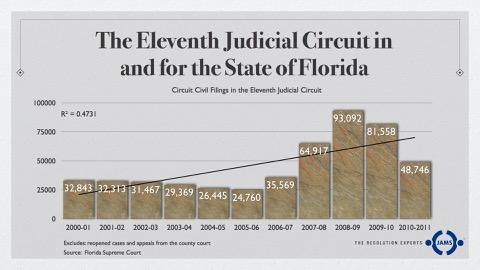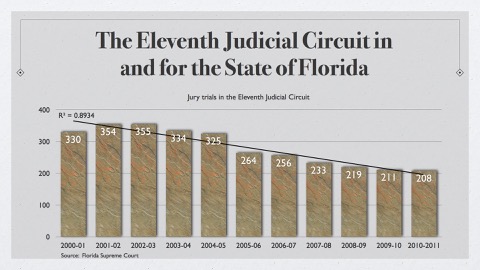September 2012
So You Think Your Case Will be Tried…Try Again.
September 24, 2012
Court. It’s the ultimate forum for justice and the resolution of disputes. It seems that few people ever really try to resolve a dispute before running to a lawyer, plopping down several hundred dollars with the clerk of the court, and hiring a process server to deliver the bad news to some unhappy recipient. Those who run to the courthouse usually have thoughts of a quick and neat outcome. They haven’t given much, if any, thought to the depositions, interrogatories, and motions (enough to give you motion sickness). If they are delusional or overly optimistic, they’ll expect an hour long television series starting with a wrong and ending with a verdict and a check. Everyone goes home, justice is done, and the commercial plays. It’s then time for a restroom break.
 In Miami-Dade County’s real world, a television show, no matter how good, just isn’t reflective of the reality of court. Miami’s civil division is swamped with cases, many of which are foreclosures. The trend line over the past ten years has shown a constant annual increase of new cases. An overburdened court, as you can imagine, has an impact on when cases will be heard for trial.
In Miami-Dade County’s real world, a television show, no matter how good, just isn’t reflective of the reality of court. Miami’s civil division is swamped with cases, many of which are foreclosures. The trend line over the past ten years has shown a constant annual increase of new cases. An overburdened court, as you can imagine, has an impact on when cases will be heard for trial.
Here is the hard truth - the odds of any singular case in the Civil Division of the Eleventh Judicial Circuit going before a jury is less than 1/4 of 1%. Yes, that’s right, your case has a less than 1 in 400 chance of being presented to a jury. In all of 2011, there were only 254 juries sworn in that division (the chart to the left reflects the court’s fiscal years). In the US District Court for the Southern District of Florida for both district judges and magistrates, the number was significantly less. They only tried 92 civil jury and non-jury trials. Mind you, these numbers are not reflective of jury verdicts rendered, but cases in which juries were sworn. It’s common for cases to settle immediately after a jury is empaneled.
To be blunt, there is a more than 99% chance that your case will never go before a jury. So what is likely going to happen to your quest for justice? The direct answer is your case will settle. You’ll likely bite your tongue, hold your nose, squint your eyes, and maybe shed a tear, but you’ll come to realize after your attorney spends an hour with you reading you the riot act, that it makes more sense to get a settlement you can barely live with rather than spend the next three years in appeals. Your attorney, in most instances, will be spot on.
Attorneys are like most professionals. Actually, their like most people and work on deadlines. The uber deadline for litigators is a trial setting, and before anything can go to trial in Miami, it must be mediated. That’s right, the attorneys for only a few hours will have to drop their bravado and talk to each other (sometimes in person and others through the mediator) in an attempt to resolve their case. Let’s face it, few attorneys want to make the first call to their opposition to suggest settlement. They fear the initiation of such a call will be viewed as a sign of weakness and insecurity in the strength of their client’s case.
Mediation forces people to communicate. It’s unlikely you’ve heard of a case resolving or dispute ending without some form of communication. It worked for Israel and Egypt and it worked for Britain and the IRA. When people talk, things happen. That’s what mediation is all about - communication. Sure some people play hardball and some just don’t want to play. There are lots of reasons parties take steadfast positions, but overall mediation has been hugely successful. Just look how few cases are tried before juries. The proof is in the pudding.
Since mediation is so important in the resolution of cases, it is abundantly clear that counsel must mediate as if he or she is going to trial. Cast all fears aside and make an opening statement to the opposition like your life depends on it. In all likelihood, it will be your only opening statement since your case is not going before a jury anyway. Prepare, prepare, and then prepare some more. Give your opponent all that you’ve got and make them want to settle with you on your terms. That’s how cases are won in today’s civil justice system. Really.

Here is the hard truth - the odds of any singular case in the Civil Division of the Eleventh Judicial Circuit going before a jury is less than 1/4 of 1%. Yes, that’s right, your case has a less than 1 in 400 chance of being presented to a jury. In all of 2011, there were only 254 juries sworn in that division (the chart to the left reflects the court’s fiscal years). In the US District Court for the Southern District of Florida for both district judges and magistrates, the number was significantly less. They only tried 92 civil jury and non-jury trials. Mind you, these numbers are not reflective of jury verdicts rendered, but cases in which juries were sworn. It’s common for cases to settle immediately after a jury is empaneled.

To be blunt, there is a more than 99% chance that your case will never go before a jury. So what is likely going to happen to your quest for justice? The direct answer is your case will settle. You’ll likely bite your tongue, hold your nose, squint your eyes, and maybe shed a tear, but you’ll come to realize after your attorney spends an hour with you reading you the riot act, that it makes more sense to get a settlement you can barely live with rather than spend the next three years in appeals. Your attorney, in most instances, will be spot on.
Attorneys are like most professionals. Actually, their like most people and work on deadlines. The uber deadline for litigators is a trial setting, and before anything can go to trial in Miami, it must be mediated. That’s right, the attorneys for only a few hours will have to drop their bravado and talk to each other (sometimes in person and others through the mediator) in an attempt to resolve their case. Let’s face it, few attorneys want to make the first call to their opposition to suggest settlement. They fear the initiation of such a call will be viewed as a sign of weakness and insecurity in the strength of their client’s case.
Mediation forces people to communicate. It’s unlikely you’ve heard of a case resolving or dispute ending without some form of communication. It worked for Israel and Egypt and it worked for Britain and the IRA. When people talk, things happen. That’s what mediation is all about - communication. Sure some people play hardball and some just don’t want to play. There are lots of reasons parties take steadfast positions, but overall mediation has been hugely successful. Just look how few cases are tried before juries. The proof is in the pudding.
Since mediation is so important in the resolution of cases, it is abundantly clear that counsel must mediate as if he or she is going to trial. Cast all fears aside and make an opening statement to the opposition like your life depends on it. In all likelihood, it will be your only opening statement since your case is not going before a jury anyway. Prepare, prepare, and then prepare some more. Give your opponent all that you’ve got and make them want to settle with you on your terms. That’s how cases are won in today’s civil justice system. Really.
Comments